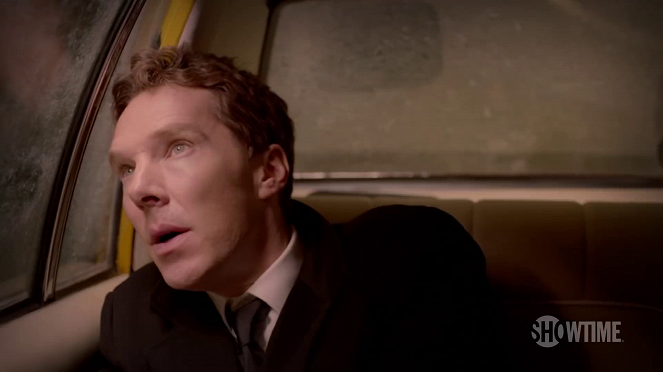Rendező:
Edward BergerForgatókönyvíró:
David NichollsOperatőr:
James FriendZeneszerző:
Volker BertelmannSzereplők:
Benedict Cumberbatch, Allison Williams, Jennifer Jason Leigh, Hugo Weaving, Holliday Grainger, Indira Varma, Jessica Raine, Anna Madeley (több)Streaming (1)
Epizódok(5)
-
A rossz hír (E01)
-
Spongyát rá! (E02)
-
Reménysugár (E03)
-
Anyatej (E04)
-
Végre valahára (E05)
Tartalmak(1)
Készülj fel a brit felsőosztály alsó szintjére! Benedict Cumberbatch (Sherlock) játssza az arisztokrata Patrick Melrose-t, aki nagy utat jár be a traumatikus, bántalmazásokkal teli gyermekkorától az önpusztító felnőttkoráig. „Rengeteget szenved és rendkívüli utazáson megy keresztül – mondja a színész. – Áldozatból túlélővé, majd bajnokká válik, és az út a társadalmi rend vicces élveboncolásán keresztül vezet.” Az ötrészes sorozat Edward St Aubyn önéletrajzi ihletésű regénysorozatán alapul. (HBO Europe)
(több)Felhasználói recenzió Matty ehhez a sorozathoz (2)
Patrick Melrose (2018)
“Of course it was wrong to want to change people, but what else could you possibly want to do with them?” Five episodes from the life of a narcissistic schizoid alcoholic with suicidal tendencies. With its relentless pace, large number of jump cuts, persistent inner dialogue, alteration of slow camera approaches and symmetrical compositions done with a roving hand-held camera, the first episode, mostly anchored in Melrose’s agitated mind, is reminiscent of an hour-long panic attack – “concentration like a flamethrower”, convulsions, tremors, suicidal thoughts. Melrose doesn't want to get sober and calm down, because he knows that he would fall into his damaged mind and get kicked around by traumatic childhood memories that hurt more than a burn or needle puncture and that are approximated by the outwardly light, but at its core horror-like, second episode (with his father as a dreaded monster), thus transforming the meaning of the first episode (we initially gleefully laugh at him and then we regret it). ___ Patrick is too honest with himself to be able to completely deny part of his self and pretend that nothing had happened to him (like the rest of the upper crust to which he belongs, at least based on his origin). Drugs and alcohol help to distract him from his thoughts and the voices in his head. ___ Melrose’s determination to take control over his own life, starting at the end of the first episode with the initial manifestation of years of supressed emotions, continues in the third episode, which at first is as apathetic, slow and humourless as a man kicking his addictions. The onslaught of emotions is strongest when Patrick is alone. On one hand, going out means seeing people who are just as unbearable as his father. On the other hand, the party to which he was invited primarily shows how the same disturbing patterns of upbringing are repeated in aristocratic families and the same humiliating rituals take precedence over human decency, which is something that Melrose will strive to avoid at all costs. The work culminates in one of the best-written, acted and rhythmised dialogue scenes that has ever appeared on the small screen. Melrose confides his darkest secret to a friend and expresses his desire to become part of the real world and to somehow be more beneficial now that he has more or less gotten clean. However, he worries that if he gets rid of his bitterness, resentment, sarcasm, snobbery and self-loathing, there may be nothing left. His friend suggests that he should try to fill his life with something more valuable, such as love and parenthood. ___ Again presented predominantly from Melrose’s point of view, the fourth episode shows, however, that even if you surround yourself with high-quality people, you will not necessarily begin to believe that you have any value yourself. Melrose strives to protect his kids from the family curse until he again sinks into depression and addiction. Though his son is not being abused, he finds himself in a similarly uncertain and stressful position as Patrick did at the same age. The final episode shows another cycle of Patrick’s debilitating struggle with himself and, at the same time, concludes one lifecycle, when Melrose buries his mother, who followed his father in death. His alternately growing and weakening belief that he can now keep himself upright on his own two feet is expressed by the alternation of two levels of the story, two motions (falling inward and moving forward). If he wants to succeed, he will have to give up not only drugs and alcohol, but also his dependency on his father, mother and everyone else who influenced him, and gain his independence from the idea of the kind of life he should lead and who he should be. Thanks to the precision, perspective and perceptiveness with which the series depicts his struggle marked by ups, downs and repetition, viewing all five episodes has something like a psychotherapeutic effect. Patrick Melrose is very entertaining, very dark and very powerful, making it the highlight of this year's live-action television production so far (and probably of Cumberbatch’s career).
()
(kevesebbet)
(több)
A rossz hír (2018) (E01)
“What's the point of a fucking window if you can’t jump out of it?” In a different mood, it is possible that I would be bothered by how much the whole thing is done for effect and that it is basically the “Quaalude scene” from The Wolf of Wall Street stretched out to an hour-long runtime, but with its darkness, nihilism and cynical humour, Melrose suited me to a tee and I can’t wait for the next episode. In addition to that, Cumberbatch is in top form, the style precisely corresponds to the protagonist’s level of sobriety and whatever is running through his head, the pace practically never lets up and the musical accompaniment comprises great songs like “Wild World” by Cat Stevens.
()

